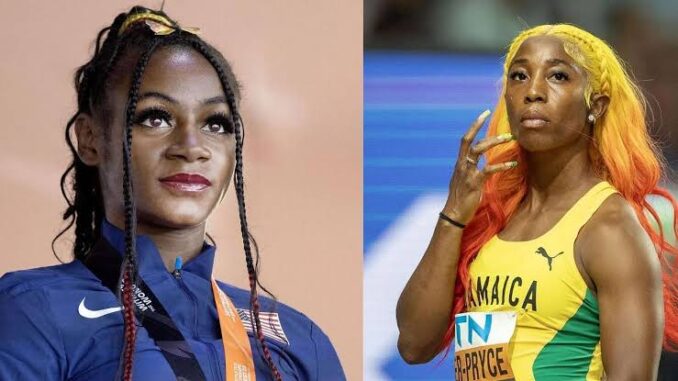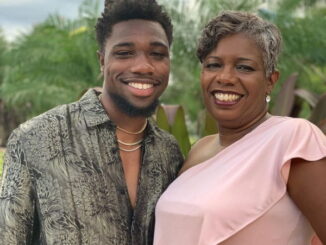
“Such a shame and unworthy of an athlete,” Shelly-Ann Fraser-Pryce shocked many with a series of mocking comments about Sha’Carri Richardson, who was caught up in a domestic violence situation with her boyfriend and was being held in custody. Fraser-Pryce called on the Tokyo Olympic organizers to ban Richardson from competing, claiming it affected other athletes. Despite facing legal trouble, Richardson responded on her personal page with a sharp post that forced Fraser-Pryce to retract her mocking comments, and the organizers had to make a bold decision!
In a moment that stunned the athletics world, Jamaican sprint legend Shelly-Ann Fraser-Pryce drew criticism after making a series of harsh remarks about American sprinter Sha’Carri Richardson, who was recently caught up in a deeply personal legal situation. Richardson, known for her explosive speed and fiery personality, had been detained following a domestic violence incident involving her boyfriend. While the details surrounding the case were still developing, the public was not prepared for Fraser-Pryce’s response.
Taking to social media and later speaking to journalists, Fraser-Pryce reportedly labeled Richardson’s situation as “a shame and unworthy of an athlete,” going further to call for the Tokyo Olympic organizers to ban her from competition. The Jamaican star suggested that Richardson’s off-track controversies tarnished the spirit of the Games and could negatively influence other athletes, particularly younger fans and aspiring runners.
The backlash was swift. Many fans and fellow athletes were shocked not only by the timing but also by the tone of Fraser-Pryce’s comments. Critics pointed out that Richardson had not been convicted of any crime at the time and was, in fact, the victim in the altercation. Mental health advocates and sports professionals alike condemned Fraser-Pryce for her lack of empathy and rushed judgment, especially considering the pressures female athletes face in the public eye.
But perhaps the most impactful response came from Sha’Carri Richardson herself. In a bold, composed post on her personal social media account, Richardson addressed the situation directly. Without mentioning Fraser-Pryce by name, she wrote:
“They love to see us fall, especially when we’re standing in our truth. I’ve been tested, torn, and dragged—but I’m still running. And the track is where I’ll respond, not on anyone else’s timeline.”
Her statement, both powerful and restrained, went viral. The post was widely praised for its strength, and fans flooded her comments with messages of support. In the wake of this response, and amid growing pressure from the global athletic community, Fraser-Pryce released a retraction. In a formal statement, she acknowledged that her comments were made in haste and without full understanding of the situation. “Athletes should support one another, especially during times of personal hardship,” she wrote. “For that, I sincerely apologize.”
As the controversy swelled, all eyes turned to the Tokyo Olympic organizers. After days of internal deliberations and public outcry, they issued a bold decision: Sha’Carri Richardson would not be banned from competing, as no disciplinary rule had been broken. They emphasized their commitment to athlete mental health and fairness, stating that personal legal matters should not automatically disqualify competitors unless official sanctions apply.
The incident has since sparked a broader conversation about athlete conduct, judgment in the media, and the importance of compassion—especially among peers. While tensions between Richardson and Fraser-Pryce may take time to heal, the outcome underscored a powerful truth: even in the world of elite competition, humanity must come first.



Be the first to comment